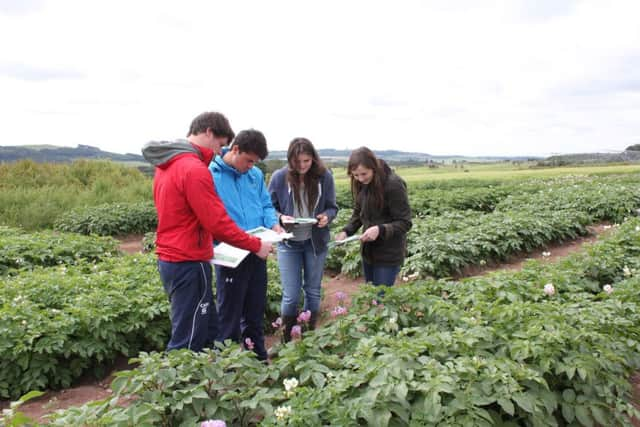‘Tattie roguer’ shortage threatens Scots reputation


Farmers and agricultural experts are calling for more “tattie roguers”, trained to root out diseased and undesirable plants lurking among the crop.
They fear a shortage of the seasonal taskforce could threaten Scotland’s reputation as a leading supplier of quality, disease-free seed potatoes.
Advertisement
Hide AdAdvertisement
Hide AdOnly properly trained roguers have the skills, senses and stamina to identify and eliminate infected plants, they say.
Seed potatoes are the smaller tubers other growers plant to cultivate the varieties that end up on grocers’ shelves.
Scotland produces 80 per cent of all seed potatoes grown in the UK – 300,000 tonnes a year, mainly for export. More than 80,000 tonnes go to non-EU countries such as Egypt and Israel, while EU customers include the UK’s own domestic market, Cyprus, Spain and the Canary Islands.
Roguing is hard work, with sometimes gruelling 12-hour shifts in all conditions.
But it can be a lucrative summer job. Skilled workers can earn £10 to £15 an hour, with a potential income of up to £3,550 for the season.
Spud fanatic Alan Romans, a retired seed potato grower from Fife and author of The Potato Book, quit roguing at 60 because of a hip problem. He still misses the work, which he says is crucial to maintaining Scottish Government standards and the country’s global status as a producer.
“I used to love the life,” he said. “It’s far better than sitting on your backside at a desk or standing in front of a class, even though it was hard and dirty. It is a completely different way of life. We used to let our hair grow and get as brown as berries. But having the right training and a good eye is very important. Not everyone can do it.”
Agricultural writer and ex-farmer Andrew Arbuckle said: “Why do buyers from places as far afield as Egypt and Vietnam come to this small country in the north-western corner of Europe? Because seed potatoes grown here are healthier and have less virus disease than almost any other country in the world.
Advertisement
Hide AdAdvertisement
Hide Ad“A vital part of keeping potato crops up to scratch healthwise is removing any that are diseased or are a different variety to the rest of the crop.”
Euan Fraser, senior potato consultant at Scotland’s Rural College, which runs a five-day roguing course, said: “There is a real opportunity to earn some cash, develop a tan and make friends for life. It is a skilled job with real responsibility, but one that is ideal for somebody keen on spending the summer out of doors instead of in an office.”
Fiona Strang, who rogued as a student, added: “When I accepted a job potato roguing one summer on a friend’s farm I had no idea it was on the condition I first passed a college exam, learning to identify at least 50 varieties of potatoes and spot a range of diseases.
“And working outside means baking sun and torrential rain in equal measure. Glamorous it is not. Some days I would resemble a mud wrestler, and the smell of a field diseased with blackleg is something I will never forget.
“However, for fresh air, laughter and friendship you can’t beat it – and the pay was pretty good too.”